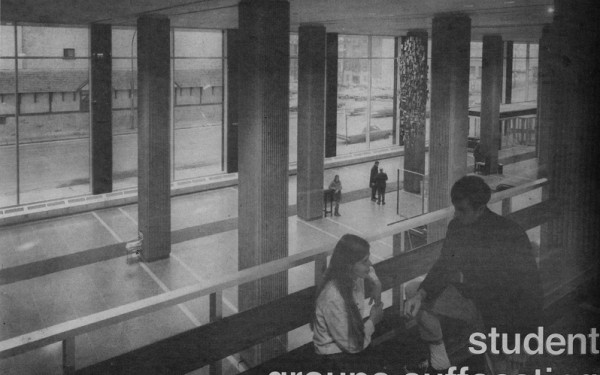Student Centre Rejected
Near-Record Number of Voters Oppose Student Union Fee Levy
Concordia students handed Fusion its first major political defeat last Thursday, as the slate’s proposed Student Union Building fee levy was overwhelmingly voted down.
Coming out in near-record numbers for a Concordia Student Union byelection, 69 per cent of Concordia voters cast their ballots against a series of fee levies that would go towards the purchase of a $43 million SUB. Had the fee levy passed, students would have paid $4.50 per credit into the multi-million dollar project by the summer of 2012.
It was the second time in an eight month period that students voted on the purchase of a SUB, which was one of Fusion’s central platform points during the 2010 CSU general election.
“I think this referendum struck a nerve with students, and when you hit a nerve, people react,” said CSU VP External & Projects Adrien Severyns, who spearheaded Fusion’s SUB campaign. “We have to respect the message students sent to us and work towards a different solution for student space.”
Fusion was swept into office last March, taking 26 of 29 seats on the CSU Council and every available Senate and Board of Governors seat. But the team of experienced student politicians met resistance from within their slate and from grassroots student movements in the lead up to the Nov. 23 byelection.
“I think it’s just great to see that students got out there and voted,” said CSU President Heather Lucas. “Now we’re just going to have to keep working with students and see what it is they want.”
Opponents of the Yes campaign claimed the referendum question misled students about the cost of the SUB, that the Concordia administration would have too much control over the SUB and that the student cost of the building was unjustified as Quebecers will be facing university tuition hikes in 2011.
Going into the referendum, Severyns was facing accusations that he had abused the CSU’s resources, overspent the campaign’s budget cap of $375 and violated a number of the union’s electoral procedures.
According to official CSU referendum bylaws, Yes and No committees must have access to the same resources while campaigning.
In a nine-page contestation sent by CSU Councilor Lex Gill to Chief Electoral Officer Oliver Cohen, Gill alleged that Severyns used a salaried employee for his campaign and sent out e-mails to all CSU clubs using the union’s mailing list.
In her contestation, filed just days before the election, Gill claimed that none of these resources would have been available to a No campaign.
When asked if he thought the campaign was dirty, Cohen told The Link he thought it was “not clean.”
The CSU also came under fire from a number of unofficial No campaigns at the university around the time of the contestation.
We weren’t opposed to a student centre but […] with a project of that size, you want people to be informed.
—Ayanda Dube,
unofficial No campaigner
“We just didn’t understand the urgency of having a student centre,” said Ayanda Dube, who visited classrooms with his friend Joseph Munyenyiwa to speak out against the fee levies. “We weren’t opposed to a student centre but we just didn’t think students had enough information about it. And with a project of that size, you want people to be informed.”
Dube and Munyenyiwa campaigned without an operating budget or political experience, and without the knowledge that other No campaigns were taking root around them.
“The first time we realized there were other No campaigns was when we were making classroom visits,” said Munyenyiwa. “We ran into Sibona [Madewa] in a classroom the week before the election. She presented her ‘Vote No’ speech and then we went through with ours. It was encouraging to see other people like us out there.”
Madewa, who is the VP Internal of the Political Science Student Association, applied for her opposition campaign to be recognized and provided with a $375 budget by Cohen on Nov. 17. Her request was denied because it came a few days after the application deadline—but she persisted.
Enlisting the help of fellow student Gonzalo Nieto, MaDewa created a “Vote No” Facebook page that garnered almost three times more support than the CSU’s “Vote Yes” page.
The Yes campaign was delivered a final blow on Nov. 17, when Gill confirmed that the Faubourg was the planned site of the SUB.
Although 1,652 of the 2,397 byelection voters opposed the fee levy, Severyns said the student centre project is still very much alive.
“Whether it’s in a year, or in five years, it’s going to happen,” he said.
Concordia students now pay $2 per credit for the purchase of a SUB and have banked nearly $7 million towards the project since 2006. The $2 fee levy is set to expire in 2014, but Concordia administration and the CSU are still under contract for the joint purchase and operation of a SUB, an agreement that could last up to 70 years.
This article originally appeared in Volume 31, Issue 16, published November 30, 2010.

__900_675_90.jpg)
__900_600_90.jpg)


__600_375_90_s_c1.jpg)

__600_375_90_s_c1.jpg)